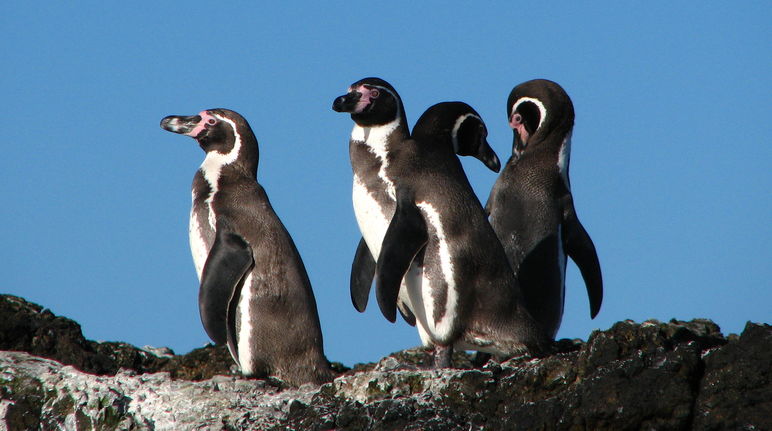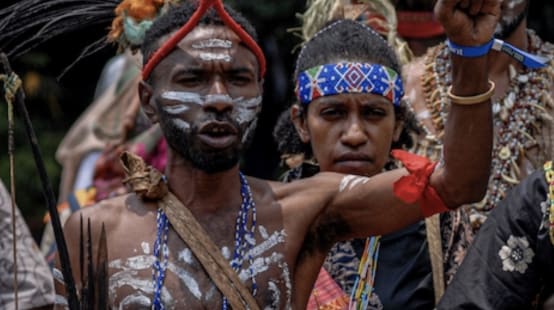Save the habitat of 26,000 Humboldt penguins!
 Rare birds: Humboldt penguins live on the coast of Chile and Peru (© Stefan Görlitz / Sphenisco)
Rare birds: Humboldt penguins live on the coast of Chile and Peru (© Stefan Görlitz / Sphenisco)
The petition with more than 220,000 signatures was delivered to the Chilean government. Rainforest Rescue will continue working to protect the penguins in cooperation with the NGO Sphenisco.
Chile wants to build two industrial ports in the habitat of the Humboldt penguin, endangering 13,000 breeding pairs of this vulnerable species. The first planned port has already been approved by the authorities. Local environmentalists fighting the project need international support: please sign our petition to have it scrapped.
Call to actionTo: Chilean President Michelle Bachelet, Environment Minister Pablo Badenier
“The habitat of 13,000 breeding pairs of Humboldt penguins will be endangered by the construction of two industrial ports. Please scrap the projects now.”
The Pacific around the Chilean island of Chañaral is one of the world's great biodiversity hotspots. Eight whale and nine dolphin species feed in the cold waters of the Humboldt current and bottlenose dolphins raise their young there. Thousands of penguins dive for sardines in the marine protected area.
Humboldt penguins are listed as vulnerable by the International Union for Conservation of Nature (IUCN), and the Chilean Reserva Nacional de Humboldt Pingüino is home to around 80% of the species' wild population. Building ports in the area would thus push the Humboldt penguin closer to extinction. Other marine animals would be impacted by boat traffic and pollution. Inhabitants of the coastal region would stand to lose income from fishing and tourism.
Humboldt penguins are listed as vulnerable
The first port of the Cruz Grande Compañía Minera del Pacífico mining company in Chungungo has been approved, despite grave concerns expressed by environmentalists and authorities responsible for fisheries and marine protected areas. Fishermen from Caleta Hornos and MODEMA, a local citizens' initiative, are suing to have the approval reversed.
The approval process for the second port, which is part of the Andes Iron mining company's Dominga project, is currently entering a decisive phase. Environmentalists fear that the impact on the fragile ecosystem and the penguins will once again be overlooked.
The fight against three coal-fired power plants in the Coquimbo region in 2010 showed that activism can make a difference: After Rainforest Rescue collected more than 18,000 signatures for local environmentalists, the plans were dropped.
Chilean activists are once again fighting for their environment, the seas and the Humboldt penguins. Please support them with your signature.
BackgroundLa Higuera-Chañaral Island Declaration
La Serena, 25. January 2016 Through great concern for the biodiversity of the coastal region of La Higuera/Chañaral Island, and the wellbeing of the residents of the region, Sphenisco e.V, natural protection organizations, and friends of nature throughout the world are turning to the responsible parties in Chile, as well as the Chilean and international public. The cause of the concern is the current review of the Dominga Project from the company Andes Iron through the Servicio de Evaluaciõn Ambiental of the Coquimbo Region (the governmental organization responsible for environmental impact statement reviews, hereinafter SEA).
Between August 2012 and January 2015, this same SEA reviewed the application of the company CMP (Compania Minera del Pacífico S.A.), for a port project in the La Higuera/Chañaral Island area, and did so in an improper and insufficient manner, with the result that the project was approved. As a result, legal suits have been brought against this decision and are currently in process. This port is intended to be built in a marine region that houses numerous threatened species. Eight species of whale and nine species of dolphin regularly visit this area during their seasonal migrations, and use this area as a source of food. 70 Common bottlenose dolphin (Tursiops truncatus) live here permanently. This is the only group of this species that lives throughout the entire year in Chile. Here lie two marine protection areas: the Reserva Marina Islas Choros y Damas and the Reserva Marina Isla Chañaral and theNational Protection Area of the Humboldt Penguin (Reserva Nacional Pingüino de Humboldt).Together, these areas are the first and only protection areas for Humboldt Penguin on the planet, where approximately 13,000 breeding pairs live. These penguins represent 80% of the entire wild population of the threatened species of the Humboldt Penguin (spheniscus humboldti).
Although the marine areas of La Higuera/Chañaral Island in northern Chile are one of the 35 most important hotspots of biodiversity on the planet, that are particularly worthy of protection, the company CMP was not required to make any statements regarding the project’s impact on the environment. Thus the company was able to ignore the fact that the coastal area between Caleta Hornos and Chañaral Island is one unified ecosystem. CMP therefore did not have to answer to the impact on the federally-declared marine protection area that would be only 14 sea miles away. Nor did CMP have to answer to the 15 state-protected areas set up for the harvesting of shellfish, that would also be potentially endangered by the presence of a port at the intended location. The responsible governmental authorities pointed out the connection between the port and the danger to these protection areas from the very beginning of the review process, and required that the company address the impact of the environmentally-damaging emissions from the ship traffic that would result when the water currents transport the pollutants there. This requirement was not addressed in the environmental review and the project was nevertheless approved! No conditions were imposed upon CMP, as were demanded by the regional Sernapesca (the regional fishery authority) and Subpesca (the Undersecretariat for Fisheries and Aquaculture), such as rules for ship traffic or control measures to prevent the introduction of invasive species, etc.
Only the Regional Secretary for the Agriculture saw the causal relationship between the port project and the environment, and therefore voted against it. This situation functions as a portent of something calamitous and throws a peculiar light onto the political situation in Chile, when the dissenting vote resigns five days after the project’s approval, claiming alleged problems of a personal nature made the ability to remain in office impossible. When powerful interests are at play, reality has to step back (see also Letter to the President, from Coquimbo, 12 February, 2015 https://www.sphenisco.org/index.php.es).
It is feared that the current review of the Dominga Project (for the Company Andes Iron) will again not go through a thorough and correct examination of the environmental impact, and that the marine regions of La Higuera/Chañaral Island will be irreversibly damaged. It must not again be disregarded that
1. the planned port facility of Totoralillo Norte, also to be in the immediate vicinity of the main feeding area of threatened species such as the Humboldt Penguin (spheniscus humboldti), the sperm whale (Physetet macrocephalus), the Peruvian Diving-petrel (Pelecanoides garnoti) and that the ship traffic will also be routed through this feeding area.
2. the noise and vibrations of the expected ship traffic in an area, where for over the last 50 years no large ship has traveled, will have a negative impact on the breeding areas and therefore also disturb the reproduction of the affected species.
3. the Humboldt Stream flows from south to north and thus into the protected areas, and not, as the company attempted to maintain, from north to south. Therefore, the results of the expected emissions must be taken into account when conducting the environmental impact survey, and primarily the oil and fuel from the ships, the iron ore that falls from the ships and contaminate it, the release into the sea of concentrated salt brine from the planned desalinization plants, as well as the results of any potential ship accidents. These emissions would strain the water quality and endanger the designated protection areas, as well as the 15 managed shellfish harvest locations and five locations where aquaculture is done.
4. the planned desalinization through the sucking up of water from the sea would destroy many organisms that are the basis of the productivity of this marine area.
5. the danger of the significant productivity of this marine area would also endanger the livelihood of the citizens there. The current productivity allows the residents to generate meaningful revenue, through fishing, the harvesting of shellfish, and through tourism.
If the SEA continues with the motto, “the company Andes Iron is building a port, and the ship traffic and the emissions spread in the marine current have nothing to do with it”, they breach their own duties and allow private interests to dominate the common good. That would result in irreversible damage to the biodiversity in the marine areas of La Higuera/Chañaral Island, endanger the earnings of the residents of the area, and result in the country of Chile contravening its international commitments.
We call for the politically responsible parties to assess the Dominga Project (for the Company Andes Iron) based on real, objective conditions, and to review the approval process of CMP’s Cruz Grande port for irregularities.
Sphenisco e.V. http://www.sphenisco.org, Germany sphenisco@online.de
To: Chilean President Michelle Bachelet, Environment Minister Pablo Badenier
Madame President,
Minister Badenier,
Ladies and Gentlemen,
Around 13,000 breeding pairs of Humboldt penguins still live along the coast in the north of your country. The Reserva Nacional de Humboldt Pingüino located there is home to around 80% of the species' wild population, which is listed as vulnerable by the International Union for Conservation of Nature (IUCN).
Despite the precarious situation of the penguins, two industrial ports are planned for the region. The realization of these ports would cost dolphins and whales their hunting grounds, while other marine animals would be impacted by boat traffic and water pollution. The inhabitants of the coastal region stand to lose income from fishing, harvesting of seafood and tourism.
Despite the grave concerns expressed by the authorities responsible for fisheries and marine protected areas with regard to its impact on the marine ecosystem, approval was granted for the harbor in Chungungo. For the port of the Dominga Project, the approval process is currently in a decisive period.
Environmentalists fear that the impact that these projects will have on an ecosystem of world renown will once again be ignored. We hereby express our agreement with the Higuera-Isla Chañaral Declaration dated 25 January 2016.
Please consider your responsibility for the survival of the Humboldt penguins and protect their habitat on the Chilean coast.
Kind regards,













 Recent successes
Recent successes